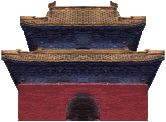Black Holes
General Discussion
Pages: 1
Black Holes
0
posted08/01/2004 12:08 AM (UTC)by

Member Since
05/30/2004 06:03 PM (UTC)
In many ways, stellar evolution is now reasonably well understood.We know how stars are born, and how they create their energy, how they die-some with a thimper other with a BANG.But when we come to consider stars of really enourmous mass, we have to admit that there are still some details about which we are far from clear.
Consider a star which is too massive even to explose as a supernova.When it's energy runs out, gravity will take over and it will start to collapse.The Process is remarkably rapid; there is no outburst-the star simply goes on becoming smaller and smaller,denser and denser.As it does so, the escape velocity rises, and there comes a time when the escape velocity reaches 300,000 kilometers per second. This is the speed of light.The old star has been surrounded by a "forbidden" area from which NOTHING can ascape.it has created a black hole.
For reasons, we cannot see a black hole.It emits NO radiation at all.Therefore, our only hope of locating such an object is by detecting it's effects upon something we can see.Probably the best is Cygnus X-1 so called because it is an X-Ray source.The system consists a B-type supergiant, HDE 226868, which is of the ninth magnitude.It seems to have about 30 times the mass od the Sun, whith a diameter of perhaps 18 million kilometers, it is associated with a inviso secondary with 14 times the Sun's mass.The orbit is 5 days as we can tell so far from the 5000 light years.What seems to be happening is that the black hole is pulling things away from the supergiant, and "eating" it up.Before all the material dissapears, it is whirled around the supergiant, and is so intensely heated that it gives off the X-ray radiation which we pick up.
The size of the black hole depends upon the mass of the collapsed star.The critical radius of a non-rotating black hole is called the Schwarzchild radius, after the Ferman astronomer who investigated the problem mathematically in 1916.The Schwarzchild radius would be 2 kilometres for a body the mass od the Earth value.
There may be massive black holes in the centres of very active galaxies, such as Seyfert galaxies, and also inside quasars, which are exceptionally remote and super-luminous.In 1994, the Hubble Telescope indicated that there is such a black hole in the the center of the galaxy M87.
It has been theoried that many galaxies, and also many globular clusters, may have central black holes.This is a possibilty,but we can't prove or disprove the fact that there might be a black hole in the center of our galaxy, The Milky Way.
^The following was an opinion, thank you.I'm looking forward to replies and fellow MKO members' opinions on this subject.
Consider a star which is too massive even to explose as a supernova.When it's energy runs out, gravity will take over and it will start to collapse.The Process is remarkably rapid; there is no outburst-the star simply goes on becoming smaller and smaller,denser and denser.As it does so, the escape velocity rises, and there comes a time when the escape velocity reaches 300,000 kilometers per second. This is the speed of light.The old star has been surrounded by a "forbidden" area from which NOTHING can ascape.it has created a black hole.
For reasons, we cannot see a black hole.It emits NO radiation at all.Therefore, our only hope of locating such an object is by detecting it's effects upon something we can see.Probably the best is Cygnus X-1 so called because it is an X-Ray source.The system consists a B-type supergiant, HDE 226868, which is of the ninth magnitude.It seems to have about 30 times the mass od the Sun, whith a diameter of perhaps 18 million kilometers, it is associated with a inviso secondary with 14 times the Sun's mass.The orbit is 5 days as we can tell so far from the 5000 light years.What seems to be happening is that the black hole is pulling things away from the supergiant, and "eating" it up.Before all the material dissapears, it is whirled around the supergiant, and is so intensely heated that it gives off the X-ray radiation which we pick up.
The size of the black hole depends upon the mass of the collapsed star.The critical radius of a non-rotating black hole is called the Schwarzchild radius, after the Ferman astronomer who investigated the problem mathematically in 1916.The Schwarzchild radius would be 2 kilometres for a body the mass od the Earth value.
There may be massive black holes in the centres of very active galaxies, such as Seyfert galaxies, and also inside quasars, which are exceptionally remote and super-luminous.In 1994, the Hubble Telescope indicated that there is such a black hole in the the center of the galaxy M87.
It has been theoried that many galaxies, and also many globular clusters, may have central black holes.This is a possibilty,but we can't prove or disprove the fact that there might be a black hole in the center of our galaxy, The Milky Way.
^The following was an opinion, thank you.I'm looking forward to replies and fellow MKO members' opinions on this subject.


About Me

0
WOW! I can't believe you took the time to write all that out. Nice going Steph. Oh yeah, and happy Bday too!^_^
About Me
 Wow, I shrunk...
Wow, I shrunk...
0
Ure Smart

0
^Looks like you didn't read the whole thing.

0
....No I didn't.What is Andromedia anyways?


About Me
For the most in-depth, in-detail, Mortal Kombat lore analysis vids, there's only one source:
0
Do stars "grow"? Do they get bigger as time goes on? If all stars aren't the same size, are the bigger stars older?
About Me
 Ghostdragon - Fan Submission Director ghostdragon@mortalkombatonline.com
Ghostdragon - Fan Submission Director ghostdragon@mortalkombatonline.com
Mortal Kombat Online - The Ultimate Mortal Kombat Experience
http://www.mortalkombatonline.com
-Isaac Watts
0
| KENSHIKW2 Wrote: In many ways, stellar evolution is now reasonably well understood.We know how stars are born, and how they create their energy, how they die-some with a thimper other with a BANG.But when we come to consider stars of really enourmous mass, we have to admit that there are still some details about which we are far from clear. Consider a star which is too massive even to explose as a supernova.When it's energy runs out, gravity will take over and it will start to collapse.The Process is remarkably rapid; there is no outburst-the star simply goes on becoming smaller and smaller,denser and denser.As it does so, the escape velocity rises, and there comes a time when the escape velocity reaches 300,000 kilometers per second. This is the speed of light.The old star has been surrounded by a "forbidden" area from which NOTHING can ascape.it has created a black hole. For reasons, we cannot see a black hole.It emits NO radiation at all.Therefore, our only hope of locating such an object is by detecting it's effects upon something we can see.Probably the best is Cygnus X-1 so called because it is an X-Ray source.The system consists a B-type supergiant, HDE 226868, which is of the ninth magnitude.It seems to have about 30 times the mass od the Sun, whith a diameter of perhaps 18 million kilometers, it is associated with a inviso secondary with 14 times the Sun's mass.The orbit is 5 days as we can tell so far from the 5000 light years.What seems to be happening is that the black hole is pulling things away from the supergiant, and "eating" it up.Before all the material dissapears, it is whirled around the supergiant, and is so intensely heated that it gives off the X-ray radiation which we pick up. The size of the black hole depends upon the mass of the collapsed star.The critical radius of a non-rotating black hole is called the Schwarzchild radius, after the Ferman astronomer who investigated the problem mathematically in 1916.The Schwarzchild radius would be 2 kilometres for a body the mass od the Earth value. There may be massive black holes in the centres of very active galaxies, such as Seyfert galaxies, and also inside quasars, which are exceptionally remote and super-luminous.In 1994, the Hubble Telescope indicated that there is such a black hole in the the center of the galaxy M87. It has been theoried that many galaxies, and also many globular clusters, may have central black holes.This is a possibilty,but we can't prove or disprove the fact that there might be a black hole in the center of our galaxy, The Milky Way. ^The following was an opinion, thank you.I'm looking forward to replies and fellow MKO members' opinions on this subject. |
Take a gander at this thread... I'll be back later.
http://www.mortalkombatonline.com/content/forum/showmessage.cds?name=main&message;=43370
GD

0
| ]0MBAT Wrote: Do stars "grow"? Do they get bigger as time goes on? If all stars aren't the same size, are the bigger stars older? |
Well, in their "growing" stage, they do "grow".Some stars enlarge because of gas events, with all the different gasses and elements.Bigger stars doesn't neccisarily mean they are older, actually it kind of depends.As far as the stars I'm studying, the grow enlarge because of gas events and/or age.
This is how our sun is "born" and it's life:
1.Born in a cold,dark, nebula cloud
2.Stars formed the nebula
3.The sun was a cool star at first
4.*Current Stage*
5.Towards the end of it's life, the sun will swell into a red giant
6.Blows up and becomes a planetary nebula
Pages: 1
© 1998-2025 Shadow Knight Media, LLC. All rights reserved. Mortal Kombat, the dragon logo and all character names are trademarks and copyright of Warner Bros. Entertainment Inc.







